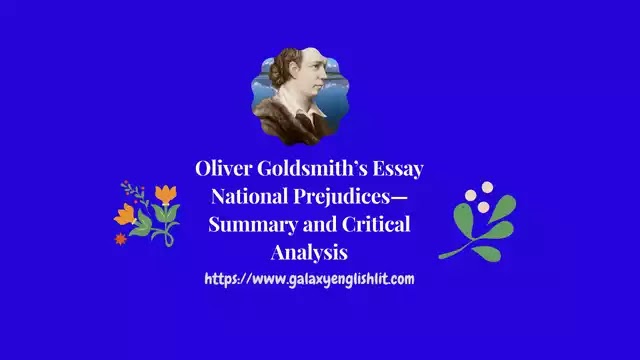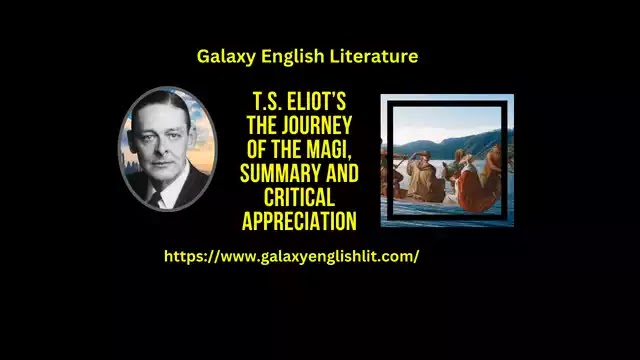Introduction of the Poem:
“After Blenheim” is an anti - war poem written by English Romantic poet laureate Robert Southey in 1796. The poem is set at the site of the Battle of Blenheim, with the questions of small children about a skull one of them has found. An old man named Kaspar tells two small children of burned homes, civilian casualties and rotting corpses, while repeatedly calling it a famous victory. Actually , the poem tells the after effects of the war which was fought near the village of Blenheim , in Bavaria , on the left bank of the river Danube on August 13 , 1704. The French and Bavarian, under Marshall Tallard and Marsin, were defeated by the English and Austrians, under the Duke of Marlborough and Prince Eugene. The French and Bavarians were taken by surprise in the village and their armies were badly handled. On the opposite side Marlborough and Prince Eugene showed themselves splendid cavalry leaders and led an attack that proved successful through its very recklessness. The French and Bavarians lost thirty thousand while Marlborough's loss was only eleven thousand. The battle broke the prestige of the French King. And when the Duke of Marlborough returned to England his nation built a magnificent mansion for him and named it Blenheim Palace after this battle.
 |
| Poem After Blenheim by Robert Southey—Introduction, Summary and Theme |
In the poem, we observe that the old man could not tell his grandchildren why the battle was fought or what good came of it. He only knew that it was a ‘great victory’. That was the moral of so many of the wars that devastated Europe for centuries. The kings fought for more power and glory and the peasants fled from burning homes and the soldiers fell on the fields. The poem gives an idea of the real value to men of such famous victories as that of Blenheim.
Summary of the Poem:
It was a summer evening. The atmosphere was peaceful and full of serenity. All the peasants working in the fields throughout the day, had returned to their homes after finishing their day's work. It was time for all the peasants to have rest after the day's hard work. An old man whose name was Kaspar, was also a peasant by profession, was also badly tired of day's work. He was sitting in front of the door of his cottage and was having relax. His grand children were playing their own games. His little granddaughter Wilhelmine was playing beside him in green lawn while his grandson Peterkin was playing in the field beside the river. While playing, Wilhelmine saw her brother Peterkin rolling something large, smooth and round. Peterkin had discovered that strange thing beside the river. Peterkin was greatly eager to know about the thing which he had never seen. As he was very little to know about such thing, he came to his grandfather to satisfy his curiosity.
After reaching to his grandfather, he gave that thing to him. The old man took that thing from the little boy and observed it carefully. The little boy stood near the old man. He seemed to be waiting for the answer from the old man. Looking at the thing, the old man shook his head in sorrow and sighed. Then he told the children that it was a skull of some person who must have died in the battle fought at Blenheim. The old man called the battle a great victory. Then he added that the Battle of Blenheim led to death of thousands of soldiers whose corpses were lying deep scattered in the fields. Further Kaspar related how he had found many such objects while ploughing the fields. He again referred to the battle as a great victory. Kaspar believed that the soldiers did not die in vain, but their death served the purpose of victory in the battle.
On hearing the fierceness of the battle, the little children felt somewhat restless and were eager to know more about battle which brought many killings. For them the battle seemed to bring thrill and excitement along with certain amazement. Peterkin asked the old man why the battle was fought. Wilhelmine was also eager to know about the war and the reason behind it. When the old man saw great curiosity of the children to know about the war, he was somewhat puzzled and tried to satisfy their curiosity by saying that he only knew that the English defeated the French badly. Actually the old man was so much over whelmed with the conventional ideas of the war that he never tried to know the reason and purpose of fighting the war. He remembered what he had heard from the people. He only repeated what the people generally said that it was glorious victory.
He kept on speaking to his grandchildren and recalled some of the sights of the war. He told the children that his father lived in a small village of Blenheim near a river. The French wreaked havoc in the village and burnt homes of several innocent people to the ground. As a result, the villagers were forced to migrate in search of shelter. The young Kaspar along with his parents had been wandering about different places in search of a suitable shelter but in vain. They could not find a home.
The war brought a huge destruction in every part of the country. A large number of people became victims of the fierce battle. Many expectant mothers and the sucking babes died in the battle. Ironically, Kaspar stated that such things often take place at every battle where there is great victory. Those who had witnessed the aftermath of the war would say that it was a shocking sight of the battlefield where thousands of dead bodies lay rotting in the sun. But, Kasper was firmly clung to his statement that such things often take place when a grand victory greets.
Kasper told the children that the people made a shower of praises on the Duke of Marlborough and Prince Eugene for having a great victory. The little child Wilhelmine was greatly surprised to hear the appreciation of the war which brought great devastation. She also wondered how her grandfather could sing praises of such a bloody war. She asked the old man in what way it could be a glorious victory. But, as the old man was badly wrapped with conventional beliefs spoke again that it was a famous victory. It was clear from the repeated statement of the old man that due to being blinded with the spirits of patriotism, he was unable to see the huge destruction made by the war or he was pretending not to reveal the dark and ugly sides of the war. He did not want to shatter the romantic ideals of war which he had nourished in his mind very carefully.
While glorifying the victory obtained in the war, he told the children that victory has its own reward whereas defeat is always condemned. Every- one spoke high of the victory. Peterkin asked what good came out of the war. Kaspar said that he had no answer of this question. He could only say that it was a famous victory.
Theme of the Poem:
War is the worst form of human behaviour and conduct. War is a man's inhuman practice against another man. It only invites destruction. Thousands of innocent people are killed in the war without any reason and thousands become homeless. The people are forced to flee because of war and wander around looking for shelter. Men, women and children all have to undergo physical and mental distress. The ordinary soldiers have to lay down their lives to fulfil the desire of some ambitious and eccentric people who only entertain themselves by exhibiting their power. When the war is conquered, the celebrations are made for the glorious victory. But none shows least interest to know about the destruction brought by the war. All this took place in the war which was fought at Blenheim in 1704. This war was fought between the English and the French. The English got a fantastic victory over the French at the cost of thousands of lives of innocent people. The skull which Peterkin finds , as well as those that Kaspar regularly unearths while ploughing are mute testimony to the truth of this observation . The poem implies that the perpetrators of war cannot or will not suppress wayward ambitions that provoke a violent response. The children as yet uncorrupted by adult thinking - readily perceive war for what it makes.
Next, in the poem, the poet shows the curious nature of the children. When the children see something unknown that seems to be strange to them, they are extremely curious to know about the thing. After finding the skull, Peterkin immediately asks to his grandfather Kaspar what it is. Kaspar tells him that it is a part of the remains of a soldier who died at Blenheim. Wilhelmine then asks Kasper to describe the war and explain its causes. Kaspar can describe what the war was like at Blenheim, but he cannot explain why the belligerents went to war. Nor does he seem to be curious about the causes. All that matters to him is that Austria and England won a glorious victory.
Next in the poem, we find that the old men like Kaspar do not have any progressive thinking. They are badly clung to the conventional beliefs and thoughts. Their thoughts about the war are inspired by the blind patriotism. Old Kaspar unquestionably accepts the loss of innocent women and children in the Battle of Blenheim as one of the prices of the glorious victory. His complacent attitude is not unlike that of modern politicians who dismiss the deaths of innocent civilians in arenas of war by referring to them with the impersonal phrase ‘collateral damage’.





